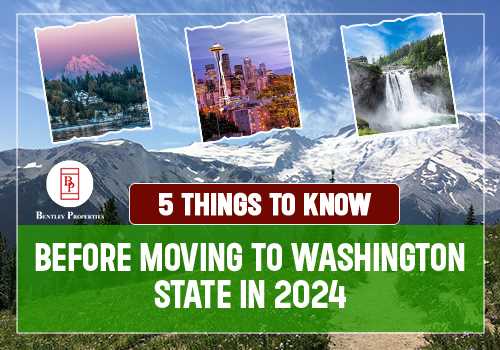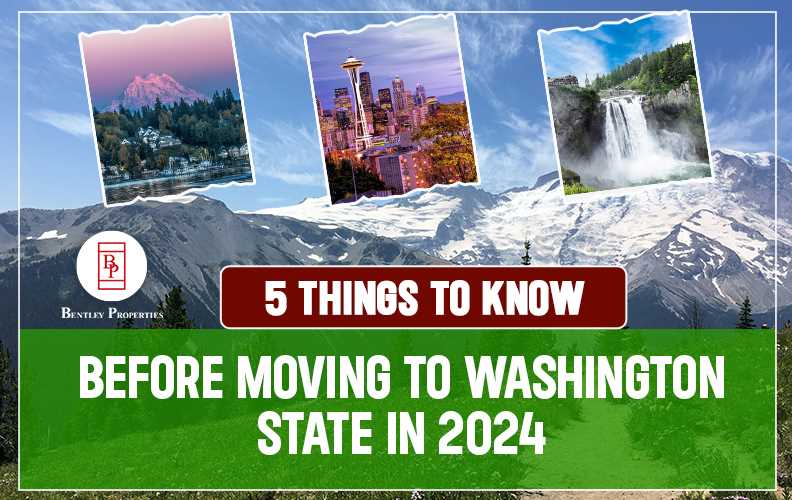5 Things to Know Before Moving to Washington State in 2024
George Moorhead
Saturday, July 13, 2024


Moving to a new state is always an exciting yet daunting prospect. `Washington State, known for its stunning landscapes, thriving tech industry, and rich cultural scene, is a popular destination for many looking to relocate. Whether you're drawn to the vibrant city life of Seattle, the picturesque scenery of the Pacific Northwest, or the state's numerous outdoor activities, there are several important factors to consider before making the move. Here are five must-know facts about Bothell, Washington real estate before relocating to Washington in 2024.
1. Diverse Climate and Weather Conditions
One of the first things to understand about living in Washington State is its diverse climate. The state is geographically divided by the Cascade Mountain Range, creating distinct weather patterns on either side.Western Washington
Western Washington, including cities like Seattle, Tacoma, and Olympia, is known for its temperate maritime climate. This area boasts comfortable winters with ample rainfall and refreshingly dry summers. Rain is a significant aspect of life here, with Seattle famously receiving about 37 inches of rain annually. However, it’s more often a light drizzle rather than heavy downpours. The lush green landscapes and thriving forests are a direct result of this moisture.
Eastern Washington
In contrast, Eastern Washington has a more continental climate, characterized by hotter summers and colder winters. Cities like Spokane and the Tri-Cities (Kennewick, Pasco, and Richland) receive significantly less rainfall and more sunshine compared to their western counterparts. Winter's consistent snowfall transforms the region into a haven for winter sports lovers.
Understanding these climatic differences is crucial when choosing where to settle. If you prefer milder, wetter weather, Western Washington is ideal. If you enjoy a drier, more varied climate, Eastern Washington might be a better fit.
2. Cost of Living
The cost of living in Washington State can vary significantly depending on the region. It’s important to research and budget accordingly before moving to Washington State.Housing
Housing costs are a major factor. Seattle, being a major tech hub, has one of the highest living costs in the state. The median home price in Seattle is significantly above the national average, and rental costs are similarly high. In contrast, housing in smaller cities and rural areas of Eastern Washington is more affordable. Spokane, for instance, offers more reasonable housing prices while still providing many urban amenities.
Taxes
Washington State has no state income tax, which is a significant financial advantage for many residents. However, the state compensates with higher sales taxes and property taxes. The combined state and local sales tax rate can be as high as 10.4% in some areas. Property taxes also vary by county, so it’s essential to consider these costs when planning your move.
Everyday Expenses
Other everyday expenses like groceries, utilities, and healthcare can also vary. Generally, urban areas tend to have higher costs, but they also offer higher wages and more job opportunities. Evaluating your potential income against the cost of living in your desired area is a crucial step in planning your move.
3. Employment Opportunities
Washington State boasts a robust job market, particularly in certain industries. Before moving to Washington State, it’s important to consider the employment landscape and opportunities available.Seattle's Booming Tech Scene: A Hub for Innovation in the Pacific Northwest
Seattle, nestled amidst the stunning scenery of the Pacific Northwest, has earned the moniker "Silicon Valley of the North" thanks to its thriving tech industry. This powerhouse attracts a multitude of tech giants, fostering a dynamic environment that fuels innovation and economic growth.
Tech Titans and Rising Stars: At the forefront of Seattle's tech landscape sit industry titans like Amazon, Microsoft, and Boeing. These household names have established a strong presence in the city, generating countless job opportunities for tech professionals, engineers, and aerospace specialists. Their influence extends beyond Seattle, creating a ripple effect that benefits the surrounding areas and propels the regional economy. But Seattle isn't just about established giants. The city boasts a vibrant startup ecosystem where innovative minds bring fresh ideas to life. From Artificial Intelligence and Big Data to the Internet of Things, Seattle's startup scene is brimming with potential, attracting venture capitalists and fostering a collaborative atmosphere that breeds groundbreaking technologies.
Beyond Tech: A Diversified Economy: While tech reigns supreme, Seattle's economy thrives on a rich tapestry of industries. The healthcare sector is a major employer, with renowned hospitals and research institutions like the Seattle Children's Hospital and the Fred Hutchinson Cancer Research Center drawing top medical talent and contributing significantly to advancements in healthcare. Education plays a vital role as well, with prestigious universities like the University of Washington and Seattle University churning out skilled graduates who fuel the innovation pipeline. These institutions also serve as research powerhouses, attracting grants and further propelling the city's intellectual capital.
Eastern Washington's Bountiful Harvest: Venture east across the state, and the landscape transforms into fertile farmlands. Agriculture is a cornerstone of Eastern Washington's economy, with sprawling apple orchards, vineyards, and wheat fields painting a picture of rural abundance. Job opportunities in farming, food processing, and related industries flourish here, offering a different yet vital facet to Washington's economic landscape.
Remote Work Paradise: The rise of remote work has presented a unique opportunity for Washington State. The state's breathtaking natural beauty, from the majestic mountains to the serene coastlines, coupled with its outdoor-oriented lifestyle, creates a magnet for remote workers seeking a perfect work-life balance. This influx of talent injects fresh energy into communities and further diversifies the state's economic tapestry.
4. Outdoor Activities and Lifestyle
Washington State is a paradise for outdoor enthusiasts. The state's diverse landscapes offer a wide range of activities that cater to various interests and fitness levels.Hiking and Camping
The state's numerous national and state parks, including Olympic National Park, Mount Rainier National Park, and North Cascades National Park, provide countless hiking and camping opportunities. Whether you’re a casual hiker or a seasoned backpacker, you’ll find trails that suit your experience level.
Water Sports
With its extensive coastline, numerous lakes, and rivers, Washington State is ideal for water sports. Activities like kayaking, paddleboarding, fishing, and boating are popular. The Puget Sound, in particular, offers excellent sailing and whale-watching opportunities.
Winter Sports
In winter, the state’s mountain ranges become a haven for skiers and snowboarders. Resorts like Crystal Mountain, Stevens Pass, and Mount Baker attract winter sports enthusiasts from all over the region.
Urban Recreation
For those who prefer urban activities, cities like Seattle and Spokane offer vibrant cultural scenes, with numerous museums, theaters, restaurants, and music venues. Farmers markets, craft breweries, and coffee shops are integral parts of the local lifestyle.
5. Transportation and Infrastructure
Understanding the transportation and infrastructure of Washington State is crucial for making informed decisions about where to live and work.Public Transit
Seattle and its surrounding areas have a relatively well-developed public transportation system, including buses, light rail, and ferries. The Sound Transit system connects Seattle with nearby cities like Bellevue, Redmond, and Everett, making commuting more manageable. However, public transit options are more limited outside the greater Seattle area.
Driving
Owning a car is essential in many parts of Washington State, especially in more rural areas or smaller cities with limited public transportation. Traffic can be challenging in larger cities, particularly Seattle, which is known for its congestion during peak hours. However, the state’s well-maintained highways and scenic byways make driving enjoyable, especially for weekend getaways and exploring the natural beauty of the region.
Cycling
Washington State is also bike-friendly, with many cities investing in bike lanes and trails. Seattle, in particular, has a strong cycling culture, and bike commuting is a viable option for many residents of Homes for Sale in Sammamish, WA .
Ferries
The Washington State Ferries system is the largest in the United States and plays a crucial role in connecting various parts of the Puget Sound region. Ferries are a common mode of transport for both commuters and tourists, offering a unique and scenic way to travel.
Moving to Washington State in 2024 offers a blend of urban sophistication, natural beauty, and diverse opportunities. Whether you are drawn by the thriving job market, the stunning landscapes, or the vibrant cultural scene, understanding these five key aspects will help you make an informed decision. As concluded by Bothell, WA Real Estate From the varying climate and cost of living to employment prospects and lifestyle choices, Washington State has much to offer. By considering these factors, you can ensure a smoother transition and a more fulfilling experience living in Washington State.
We would like to hear from you! If you have any questions, please do not hesitate to contact us. We are always looking forward to hearing from you! We will do our best to reply to you within 24 hours !
